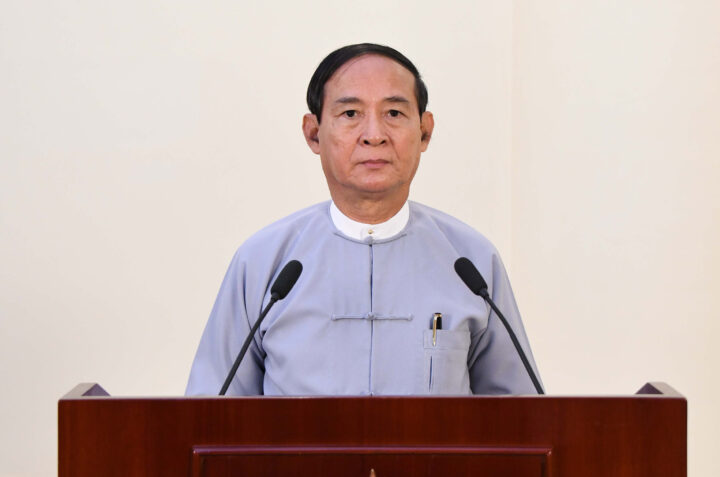11 Dec
I wish to send good wishes and blessings for auspiciousness to the speaker of the Pyidaungsu Hluttaw, speakers of the Pyithu Hluttaw and the Amyotha Hluttaw, Union Chief Justice, Union Ministers, Chairman of the Nay Pyi Taw Council, Chairman of the Anti-Corruption Commission, Chief Ministers of states and regions, secretary and members of the Anti-Corruption Commission, responsible officers of UNODC and UNDP, and invited guests who are attending this virtual celebration ceremony on the auspicious occasion of International Anti-Corruption Day which falls on 9 December 2020.
Just as convention members have been celebrating the International Anti-Corruption Day celebrations in the global community, Myanmar has been celebrating this day with pomp and ceremony since 2017. However this year because of the COVID-19 pandemic, a physical ceremony could not be held; that is the reason why we are celebrating this event virtually.
In our efforts to build a Democratic Federal Union we have exerted strenuous efforts with strong political will to eradicate corruption to promote the three pillars namely the executive, the legislative and judicial pillars characterized by transparency, integrity, fairness and the rule of law. Because we have carried out our anti-corruption efforts well, Myanmar has been given the number one ranking out of 17 Asian countries in the Global Corruption Barometer ASIA-2020 by Transparency International.
The impact of corruption is immense and widespread. It has a debilitating and destructive effect on the United Nations Sustainable Development Goals (SDG’s); it gives rise to poverty and inequality; it lowers the efficiency and capability of the government and private sectors; it causes the loss of infrastructures; it also causes the rise of unjust economic and political systems, climate change and loss of biodiversity, violations of human rights and armed conflicts. That is why corruption is a huge challenge which governments all over the world need to tackle with effectiveness.
We are working to eradicate corruption, which can have a damaging effect on the development, stability and peace of the country from all aspects, with impartiality in accordance with the law. In addition, we are establishing anti-corruption units in Union ministries and organizations under the public education and corruption eradication programmes. Furthermore, we may also see programmes for the promotion of integrity among the people.
The government has fulfilled the infrastructural requirement of the commission by opening a new international standard building in Nay Pyi Taw on 5 August 2020. More local offices of the commission have been opened in Mawlamyine Township of Mon State and Taunggyi Township of Shan State during this year for conducting anti-corruption works more effectively in closer proximity with the people in regions and states.
In today’s globalization era, corruption is not only the concern of a single country, but also a transnational crime that has impacts on societies and economic systems. To prevent and control this problem, agreements have been made among the countries and regional organizations. Especially, Myanmar joined the International Anti-Corruption Academy as the 79th member country in 2019.
For the emergence of a corruption-free society, it is necessary to investigate and combat the prevailing corrupt processes; furthermore, necessary preparations and administrative measures should be taken to eradicate corruption in the future.
It is important to remove all the root causes of corruption. This process will include to amend the complicated law, rules, orders, directives and regulations which favour law enforcement officers and legal provisions which cannot be understood by ordinary people. These processes should be included in the national anti-corruption strategy.
In addition to having a strong political will to combat corruption, as a culture which opposes corruption wins acceptance and as the people begin to practice this culture, it would be possible to enjoy benefits in areas such as public administration, systematic management of public finances, fairness, taking responsibility, equality before the law, and ability to uphold and protect integrity.
The Anti-Corruption Commission has formed a steering committee and supporting work committees to adopt the national level anti-corruption strategy for long-term effective and all-inclusive fight against corruption in accordance with responsible persons from the administrative, legislative and judicial pillars, local and foreign businesspersons, civil society organizations, news and media organizations and international organizations.
Fighting against corruption is the removal of one of the biggest major obstacles to the economic development of a country. The importance of anti-corruption is mentioned under Goal 16 of the UN 2030 Sustainable Development Goals; in the MSDP – 2018-2030 (Myanmar Sustainable Development Plan), Strategy 1.4 under Pillar (I) Peace and Stability states ‘good governance, improving performance of organizations, and improving the efficiency of administrative decision making at all levels’. Efforts are thus being made to instill good practices among the public service personnel, and civil service organizations, to work in the interest of the country with increased efficiency and correct procedures free from corruption.
This year’s theme for the International Anti-Corruption Day is ‘Recover with Integrity’ which is appropriate during the time of the pandemic outbreak. I would like to strongly urge all responsible personnel from the three pillars – administrative, legislative and judiciary pillars and all the people to confront and overcome the economic and social difficulties and challenges of COVID-19 with integrity and free from corruption in unity, continued cooperation and increased efforts.
Thank you all.
(Translated by Kyaw Myaing, Aung Khin)


